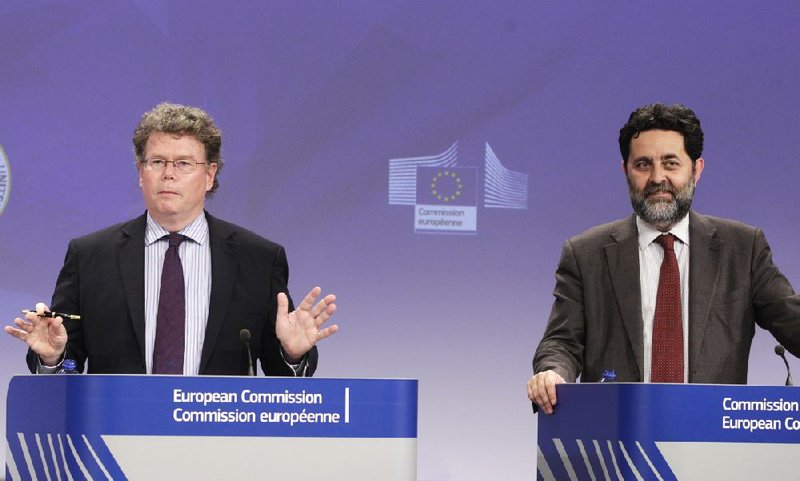BRUSSELS -- Processed meats and the prospect of genetically modified foods on dinner tables across the European Union are proving serious impediments to the signing of a free trade agreement between the United States and the 28-country bloc.
Optimism that negotiations, which marked their first-year anniversary this week, would lead to a deal to create a trading bloc of 800 million people representing about half the world's economic output have faltered amid growing public opposition. Suspicions toward the U.S. after a spying scandal and electoral considerations on both sides of the Atlantic have also not helped to foster progress.
A year ago, President Barack Obama and his European peers sought an agreement to create the trading bloc by the end of 2014.
"There was much hype a year ago," said economist Andre Sapir of Brussels-based think tank Bruegel. "That was totally unrealistic. ... It will take a long time, if it can be achieved at all."
Analysts say a deal is unlikely within Obama's second term, which ends in early 2017.
And his successor will most likely face similar obstacles in Congress where lawmakers, fearing potential job losses, have proved reluctant to embrace another free trade agreement since the North American Free Trade Agreement 20 years ago. A pact between the U.S., Japan and 10 other Pacific nations has also proved elusive.
Congress has shown little inclination to grant Obama fast track authority over trade deals -- the process empowers presidents to negotiate trade deals and present them to Congress with no amendments allowed. Many Democrats seeking re-election in November are fearful of drawing opposition amid concerns over jobs.
The political problems don't just lie in the U.S. Recent elections to the European Parliament saw opponents of integration win almost one in three seats.
"Governments will be less willing to sacrifice fragile political capital in favor of an unpopular trade agreement from which they are unlikely to make immediate political gains," said Antonio Roldan of think tank Eurasia Group.
A senior European Union official conceded that the timeline is slipping with the European Commission -- the bloc's executive branch -- now hoping to conclude a deal during Obama's current term.
"That would mean no later than 2016," said the official, who spoke on condition of anonymity because of the negotiations' confidentiality.
An agreement to lower tariffs and eliminate other trade barriers would, it is hoped, strengthen a relationship worth $1.1 trillion. It could also help the pair shape global trade rules on issues such as safety standards and pharmaceutical regulation against the growing power of China and other emerging economies.
"That is why third countries like China, India and Brazil are so fearful of the negotiations," Bruegel's Sapir said.
However, concerns may be overdone. The two sides can't even agree on chicken meat -- the European Union bans U.S. poultry imports because chickens there are rinsed with chlorine to kill germs after slaughter.
"If our chickens are going to be excluded from their market because of this false prejudice, that's a big issue," said Gary Hufbauer, a senior fellow at the Peterson Institute for International Economics in Washington, D.C.
Just as thorny is Europe's refusal to allow the import of hormone-treated beef and genetically modified crops, a key concern of consumer groups.
"The trade deal risks undermining crucial European social, health and environmental protection, including key food safety and pollution measures, which industry claims are barriers to trade," according to the campaigning group Friends of the Earth.
Information for this article was contributed by Christopher S. Rugaber and Paul Wiseman of The Associated Press.
Business on 07/19/2014
